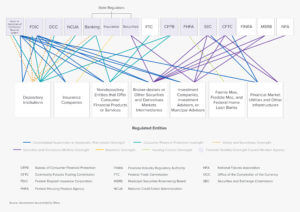We are at the threshold of the third generation of the internet: web3. Given the pace of innovation in this space, it has been challenging for many policymakers to keep up. That’s why we were so heartened by the Senate Banking Committee’s call for feedback on clarifying laws around digital assets and decentralized technology. Maintaining America’s innovation and financial edge has always depended on business leaders and policymakers collaborating to ensure that the private sector can experiment and build, while appropriate regulatory regimes help manage the real downside risks that might otherwise harm individuals.
We were happy to answer the Committee’s call. Since we believe the only viable path forward is bipartisanship, we shared our ideas with the office of each Senator on the Committee for their review. And, in the spirit of openness and transparency, we also want to share our proposals with the wider community, in the hope that this can help catalyze a conversation around the future of digital asset legislation and regulation.
Each of our four proposals is designed to stand on its own, but taken together, they represent the start to a comprehensive approach to supervision, oversight, and taxation in a decentralized environment. We have provided a short, plain English summary of the recommendations below, and the full text of our submission can be found here.
Of course, this is merely a small part of an ongoing dialogue with policymakers, civil society leaders, and other stakeholders. We look forward to your feedback on how we can do more to jointly advance decentralized technology and policy priorities such as expanding economic opportunity, consumer protection, and financial inclusion.
- Consumer Protection and Inclusion. As the number of decentralized projects grows, and as these projects become increasingly integral to our economy, policymakers need to establish a cohesive strategy for advancing consumer protection in the sector. This proposal creates a simple disclosure-based supervision regime under the Consumer Financial Protection Act, providing regulatory clarity by standardizing the existing disclosures that many projects already provide and ensuring that consumers are getting the information that they need to participate in such projects on a level playing field.
- Decentralized Autonomous Organizations. DAOs are the cornerstone of a new way to manage and coordinate human activity. But they still lack uniform legal recognition to conduct basic organizational functions such as filing and paying taxes, opening bank accounts, signing legal agreements, and limiting liability for DAO members. This proposal pulls together existing laws related to unincorporated associations and tax reporting status to create a lightweight framework around the off-chain legal status of DAOs. It also harmonizes the regulatory approach to DAOs across a number of federal agencies.
- Comparing Jurisdictional Harmonization, SROs, and Nonprofit Corporations. In 2016, the Government Accountability Office found that, “Fragmentation and overlap have created inefficiencies in regulatory processes, inconsistencies in how regulators oversee similar types of institutions, and differences in the levels of protection afforded to consumers,” and recommended that Congress consider whether changes to the financial regulatory structure were needed to reduce or better manage fragmentation and overlap. Shoehorning decentralized technology into this framework is challenging for both innovators and regulators. This proposal would direct the GAO to conduct a study comparing the costs and benefits of three approaches: (1) jurisdictional harmonization among agencies; (2) the establishment of an industry self-regulatory organization, ideally with multi-stakeholder participation; and (3) the establishment of a nonprofit corporation for technical oversight and standards-setting for decentralized technology (similar to ICANN).
U.S. Financial Regulatory Structure (click to expand)
- Tax Reporting and Related Issues of Blockchain Ecosystems. The United States tax and regulatory environments are designed for centralized operations. Yet, as currently drafted, the infrastructure bill pending in Congress would impose tax reporting requirements on a wide array of actors who would have no ability to comply. We raised this issue in a letter a16z sent to Senate leadership earlier this year. This proposal builds on the work already underway with the infrastructure bill and in other legislation to clarify sensible rules of taxation as it relates to digital assets.
-
Tomicah Tillemann
-

Miles Jennings is General Counsel & Head of Decentralization for a16z crypto.
- Follow
- X
-
James Rathmell
- Your Guide to Tokens: Types, Design, Uses, More
- SEC RFI: Creating a Safe Harbor and Crowdfunding Regime for Collectible Tokens (NFTs)
- SEC RFI: Safe Harbor for Certain Airdrops & Incentive-Based Rewards of Network Tokens
- SEC RFI: A Control-Based Decentralization Framework for Securities Laws
- Why Decentralization Matters, and Needs Incentives


